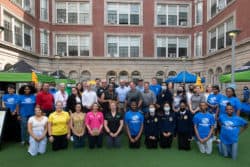In a lively schoolyard that is home to the Boys and Girls Club of Harlem, urban and rural America came together. Students who’ve only read about farmers in children’s books or sang “Old MacDonald” met actual farmers for the first time.
They asked how soybeans are grown, played on newly installed soy-based synthetic grass and competed in bingo about environmental science. The event wasn’t all just fun and games, however, as youngsters also learned about a new U.S. Department of Agriculture (USDA) report showing that plant-based products, such as soy, and the biobased industry generate economic growth and jobs across America.
U.S. soybean farmers participated in the STEM educational event “Farmers on the Green” at the Boys and Girls Club of Harlem (BGCH). The immersive experience allows children to learn about how agriculture and biobased products benefit their lives daily.
For the occasion, SYNLawn New York welcomed the United Soybean Board (USB), Indiana Soybean Alliance, New York Corn and Soybean Growers Association, and the local agricultural science chapter at John Browne High School to join them at the BGCH.
SYNLawn, the largest synthetic grass manufacturer in North America, uses soy to create its global artificial turf. So, when SYNLawn New York owner Anastasia Phillips and her team installed and donated an installation to BGCH, she knew America’s farmers had to be a part of the story.

The Boys and Girls Club of Harlem invited U.S. soybean growers and strategic partner, SYNLawn, to a STEM educational event to teach youth about biobased products and the importance of agriculture.
Then BGCH Executive Director Dominque Jones gladly welcomed the educational event to her facility. She notes that the BGCH needed a larger play space for its kids due to the COVID-19 pandemic.
“Because of Anastasia, now we have another place to play, and it’s all because of soy,” Jones says. “Ensuring that our kids have access to open, safe spaces is essential. The fact that we could open up our gates today so that kids in our neighborhood could not only experience the grass, but also make a clear connection on how rural agriculture affects their urban lives every day, was a tremendous opportunity for them.”
SYNLawn’s Technical Sales and Product Director Davis McDougal explains that soy is a large part of SYNLawn’s role as an environmentally conscious company. In addition, McDougal notes that SYNLawn’s plant in North Georgia employs more than 2,500 people. Those skilled workers use soy and other agricultural products to create SYNLawn’s biobased turf.
USDA Deputy Undersecretary Justin Maxson joined the group as the day coincided with the release of USDA’s report on the bioeconomy, or Economic Impact Analysis of the U.S. Biobased Products Industry. Deputy Undersecretary Maxson noted that when organizations, such as SYNLawn, work with farmers to create sustainable products and goods, it is beneficial to the entire U.S. economy and the environment. The report recognizes USB as a forward-looking leader for bioproducts.
Biobased products are a solution,” Maxson says. “They provide clean, responsible, and renewable products. We’re standing on a soybean-based material that helps kids in a big city play outside. And it’s exciting!”
During the New York City event, USB Vice Chair Ralph Lott II — who farms in Seneca Falls, New York — talked to the students about how soybeans are used to make at least 1,000 different products, such as a pair of sandals he showed them. In the USDA Biobased Products report, one of the case studies highlights the soy-based Okabashi® brand, states: “These shoes are molded from a proprietary, recyclable material that is 45% soy by weight. All of the company’s shoes now use the soy-based material as a replacement for the petroleum-based component of the materials — a fact that shows that the company is living up to its environmental values.”
“As a farmer, I am continually amazed by the versatility of our soybeans and how they help hundreds of companies, like SYNLawn, with their sustainability, performance and health attributes,” said Lott. “USDA’s new economic analysis shows that plant-based products help farmers grow demand for soy and create a platform for innovation and agriculture to grow together, while creating jobs in rural communities.”
Access a full copy of the USDA Report Here
Note: Dominique Jones is now Executive Director of Global Kids, a nonprofit serving underprivileged youth.
Because of the potential for biobased products to create new markets for soybeans, U.S. soybean farmers have invested millions of dollars to research, test and promote biobased products. Much of this work was done through the United Soybean Board, which is composed of 78 U.S. soybean farmers appointed by the U.S. Secretary of Agriculture to invest soybean checkoff funds. As stipulated in the Soybean Promotion, Research and Consumer Information Act, USDA’s Agricultural Marketing Services has oversight responsibilities for the soybean checkoff.
